[/caption]
Over the past few days NASA’s Cassini spacecraft has performed flybys of several of Saturn’s moons. From the ostentatious Enceladus with its icy geysers to the rugged relief of Rhea, the sharp peaks of Dione’s frigid craters and even diminutive Janus, Cassini has once again returned a stack of stunning views from the Saturnian system, nearly 815 million miles from home.
Check out some of the images, and wish you were there!
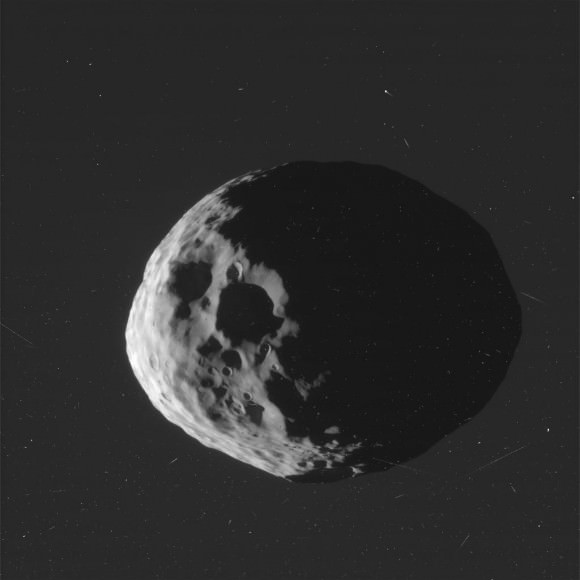

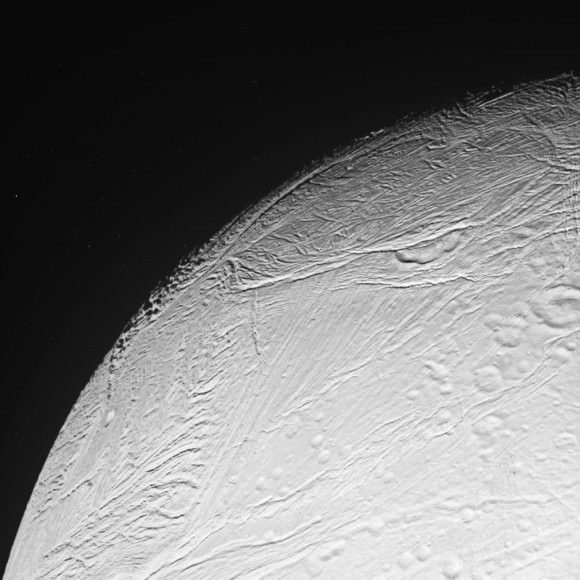
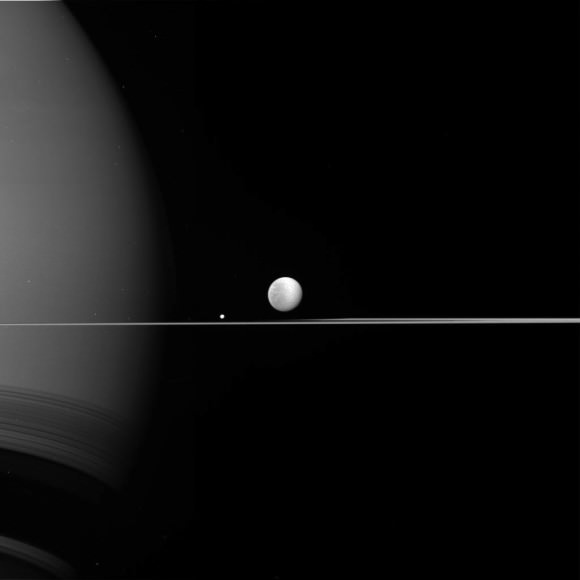
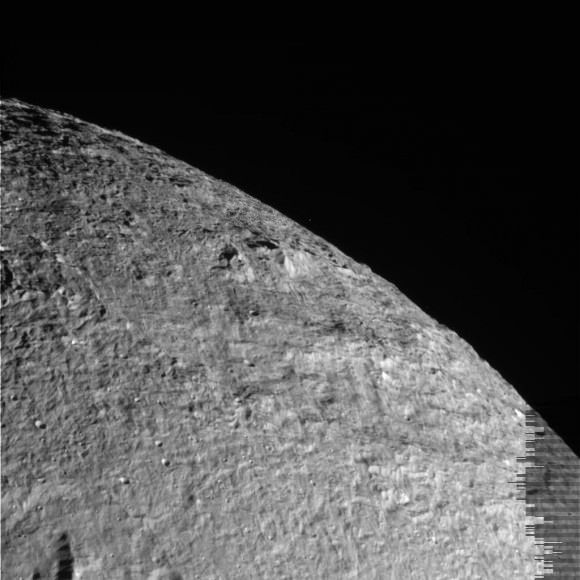
And here’s a color-composite of Janus I assembled from three raw images taken in ultraviolet, green and infrared color channels. The results were tweaked to make it a little more true-color as what we might see with our limited human vision:

“Though we’ve been in orbit around Saturn for nearly 8 years now, we still continue to image these moons for mapping purposes and, in the case of Enceladus, to learn as much as we can about its famous jets and the subterranean, organic-rich, salty, liquid water chamber from which we believe they erupt.”
– Carolyn Porco, Cassini Imaging Team leader
For more images from Cassini, check out JPL’s mission site and the CICLOPS imaging lab site here.
Image credits: NASA/JPL/Space Science Institute.

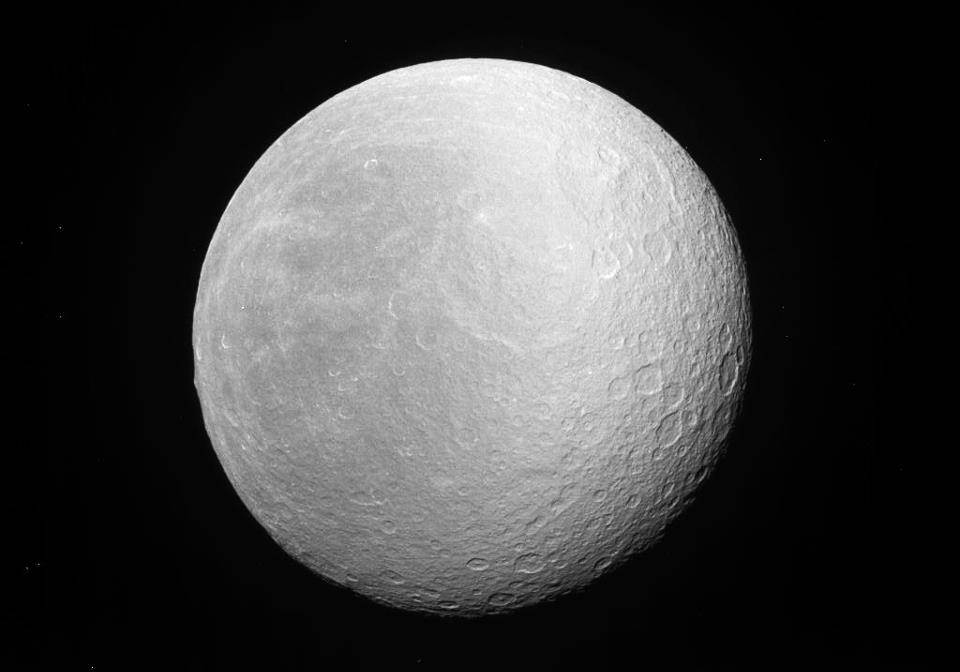
Before Man’s eventual journey to the stars, we have a whole Solar System to explore study and try to understand. These studies will put us in good stead for our explorations of the Galaxy. The photographs in this article brought this home to me this morning. Wonderful beautiful places that we know so little about and can teach us so much about our Universe. Mankind is on the threshold of an amazing era. I just hope that short-sighted politicians do not put an end to this quest.
“Before Man’s eventual journey to the stars…”
I hate to say this but the odds are highly against this ever happening. Maybe some of the closer stars but the whole Galaxy? Believing in faster than light speed is akin to believing in astrology and Ouija boards. Makes a great story but…
As for your remarks on short-sighted politicians, I feel they appropriately represent their short-sighted constituents.
And the ancients said about the same thing concerning flight in general. I paraphrase: “Any technology far in advance of ours will be seen as magic.”
Your remark about the short-sightedness of people in general, is rather cynical. I give just a bit more credit to others than you seem too. I guess it boils down to how you visualize the glass of water: half full, or half empty. Of course, I see it as half full.
The ancients didn’t have peer reviewed journals.
I would love to believe that mankind will travel the galaxy… on the other hand perhaps it would be best to just stay home? Why cause problems elsewhere?
I see the glass half filled with tainted water, half filled with carbon monoxide.
Your view of the glass might be poetic, mine is realistic.
Hopefully, one day we can clean the water and our air. However the people that accomplish this will have to believe in something better for Mankind than you seem to be able to bring to the table. Sure there are problems of ALL kinds that beset us. Are we to just give up? Or are we to search for the solutions that need to be brought to bear against these things that we ourselves have done to the environment. Pessimism is never the realistic view, except for Luddites.
“However the people that accomplish this will have to believe in something better for Mankind than you seem to be able to bring to the table….Pessimism is never the realistic view, except for Luddites.”
So I am a pessimist and luddite… well I don’t recall getting personal with you about this; I simply said I thought my view was more realistic than yours based on scientific fact.
So… how am I a pessimist & luddite? Because I actually believe Einstein (and others) have proven we can never approach the speed of light?
And even if we could, it would still take 4.3 years just to get to the nearest star. I did say I thought mankind might make it to other stars, just not travel the whole galaxy (have you measured it lately?).
So I am not a pessimist; I am just being scientifically skeptical of the original posters claim. Unless either of you can show me where I am wrong on the science, I claim you are both being waaaay too optimistic in your views. Can you prove me wrong? No.
As for being a luddite. A luddite is a person against technological change. No where did I make such a claim (and it would seem very odd given my profession).
I guess if a word sounds harsh enough it can be used (and abused) to mean anything.
C’mon now, you were being a bit of a troll and got what you deserved. Since there is currently no time limit on the human race, or whatever succeeds it, we may of course, find a way to traverse distances that currently stagger us. Einstein notwithstanding. Nobody is asking you to figure out how, just to have an open enough mind to admit there is no one who can deny the possibility.
“… just to have an open enough mind to admit there is no one who can deny the possibility.”
If you go back to my original post I said “the odds are highly against this ever happening”.
That isn’t the same as saying it is impossible. Is it?
But one has to face the fact that ‘c’ is an asymptote. You can approach it all you want but going above it just isn’t going to happen… no matter how powerful your ‘engines’ are.
Sure… maybe with enough time physicists will figure it out but so far betting against Einstein has been a bad idea (just ask poor Dr Ereditato the former head of the Opera group).
By the way… I’d expect to be labeled a ‘troll’ had I posted scientific fact on the ‘young earth creationists’ website. I didn’t quite expect it here.
the problem my friend is that you see traveling the universe as a trip…..
it isn’t, its a multi-generation self-sustaining society moving…..
we could do it tomorow……the tech is there…..only the will (money) to invest not….
“…but the tech IS there…..it’s relatively easy to build a spaceship…”
Is this an April Fool’s joke??
Radiation and health (mental/physical) aside how can you say the tech is there? Scientists have had little success just getting closed ecosystems to work here on Earth (see Biosphere 2). And you think it is currently ‘easy’ to do in space??
How can you make such a statement?
Think of the number of people needed to live in a ‘generational ship’. You need more than just an Adam and Eve. It has been theorized that 150 to 180 people would be live to make such a ship. Tell me when have we ever had more than 15 people just in orbit around Earth? It hasn’t been done so I am surprised you believe it is doable and ‘easy’ now.
How can you make such a statement?
And if we need at least 150-180 people how large a ship would that be? When have we ever built such a ship to hold that many people (and plants, livestock, FUEL, power generation)? Just to get something that size in orbit would be a monumental undertaking. We don’t have the technology to do it.
Yet you think the tech is there ‘today’ and that it is relatively easy? Relative to what pray tell?!?!
And this ship has to last. It isn’t in orbit for a 10-20 year mission. It needs to last for many hundreds/thousands of years. Space… is BIG. Going to go out on a limb here and say that the tech just isn’t there. Few things man-made on earth lasts that long (ok styrofoam is an exception).
Now let’s talk navigation. Pretend that all these issues are overcome and a ship is made. Now what? Take off for another star? Which one? And what happens when they get there and there are no planets inhabitable? Go to another… and another? This isn’t Star Trek where every star just happens to have an M class planet. This is real life.
And what if a habitable planet is found? Would there be enough fuel to stop?
You know that the Messenger probe from Earth was launched in 2004 but it didn’t begin orbiting Mercury until 2011. The change in velocity was so great that it had to use a number of gravity assists from Earth and Venus to slow itself down. Now why didn’t it just fly directly there and use fuel to slow itself down? Because it would have required a very large amount of fuel to do so. Same reason why New Horizons is going to do a flyby of Pluto. It doesn’t have the fuel to slow itself down.
Now the Messenger probe is only 1,070 lbs (485 kg) with fuel. Imagine what kind of beast of a ship we would be sending out into the galaxy and imagine the velocity it would have. Just the fuel needed for starting and stopping is more than anything we’ve ever put into space. But… you think that’s ‘easy’????
Now take all these problems and many many more and multiply them by 20; because you are going to need more than one ship right? You can’t put your eggs all in one basket.
Now… I really beg to differ with you that the tech is there ‘today’ and to even make a statement that it is easy is just wishful thinking.
Unless of course it’s really a suicide mission and you just want to get people off the planet to die in space. Sure… then it might be a pretty easy thing to do.
Don’t take any of this personal. It isn’t directed at you, it is directed at the statements you made that are wrong for very obvious reasons.
“the tech is there”
Not..
We’re a far ways away before we can confidently leave LEO for permanent habitation let alone traverse the outer regions of our solar system.
I dunno what your knowledge is based on my friend…
but the tech IS there…..it’s relatively easy to build a spaceship…(not the starwars kind off type though)….but most people (with knowledge) think it is not worth the effort nor the costs…yet….I do not agree.
We have no sure-fire way to protect ourselves from the lethal radiation in deep-space.. no fully tested way of growing our own food in space, no current way of replacing broken parts aboard your spacecraft.. barely or no amount of testing done on creating artificial gravity, conditions which are needed on long duration space flights to minimize bone loss.
These are just off the top of my head, I’m sure there are more things that need to be considered.
A lot of R&D needs to be done on life-support systems, possible 3D printers that can spit out small replacement parts, ISRU technologies etc. before we can venture out and explore the solar system
like I said…all small isues you can resolve tomorow, if you put your head and money to it.
Even DARPA think so, the head part that is, because all the money goes to the military offcoarse.
THATS the only reason you do not get money for what really matters.
a) they’re not small issues they’re big hurdles
b) of course we can resolve them if we put our mind and money into it, that’s not the point
c) part b) doesn’t imply that the technology CURRENTLY exists which is what you said in the first place
it’s not what I said….
if you give me some time, I can quote several scientists on that…..a lot off them.
you take currently like today, I say currently like within our life time (remeber the 70thies project?)
I visit this site for the great articles on an amazing frontier that is being explored in new ways and presenting alot of food for thought. Occassionally I like to read the comments for the diverse opinions and digest those opinions in the grand scheme of things. In the comments entered here, both sides present interesting points – however, and sadly, Aerandir90 and denbo68 do present their points with a taste of distain for other’s optimism. Just sayin’…
I agree skipdallas, but why let the politicians say what can be done? I will gladly donate $20 to NASA Planetary Exploration. I’m guessing we could get some donations. Perhaps we should start something?